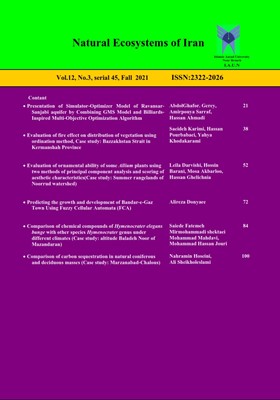Presentation of Simulator-Optimizer Model of Ravansar-Sanjabi aquifer by Combining GMS Model and Billiards-Inspired Multi-Objective Optimization Algorithm
Subject Areas : WATER RESOURCESA.G. Gerey 1 , Amirpouya Sarraf 2 * , Hassan Ahmadi 3
1 - Ph.D. Student in Civil Engineering Department, Roudehen Branch, Islamic Azad University, Roudehen,
2 - Assistant Professor of Civil Engineering Department, Roudehen Branch, Islamic Azad University, Roudehen, Iran.
3 - Assistant Professor of Civil Engineering Department, Roudehen Branch, Islamic Azad University, Roudehen, Iran
Keywords: Pareto front, MOBOA, simulator- optimizer model for groundwater, Ravansar-Sanjabi plain aquifer,
Abstract :
In the present study, a groundwater simulator-optimizer model was used to determine the optimal operation policy of Ravansar-Sanjabi plain aquifer in Kermanshah province. The proposed model is a combination of GMS aquifer simulation model and Billiard-Inspired Multi-Objective Optimization Algorithm (MOBOA) in MATLAB programming. First, the model was calibrated and validated to determine the hydrodynamic parameters of the aquifer. Then, by minimizing the three deficit objective functions comprises as the shortage affected by the failure to supply water demands, groundwater level drop and Modified Shortage Index (MSI), the model was implemented for a period of one year with 12 periods of monthly stress and the Pareto front was achieved. As one of Pareto optimal calculated responses, it can be observed that when groundwater level remains unchanged, 11.7 million cubic meters of demands will be in short supply and the amount of MSI will be 17.15. In order to specify the best option of operation policy, considering the socio-economic criteria as well as environmental consequences by the relevant officials, it is essential to select the suitable optimal response from the other Pareto optimal solutions and the corresponding withdrawal values will be determined. By studying the consequences of applying the proposed structure, it is worth noting that the proposed procedure has a high efficiency in determining the optimal aquifer strategy.
_||_

